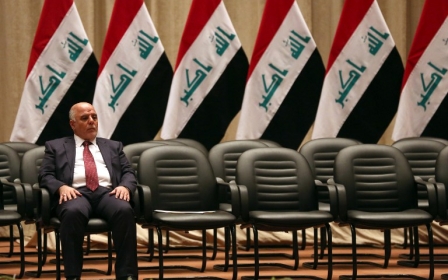Retaking Mosul is 'top priority', says Kerry in first visit to Baghdad since 2014

US Secretary of State John Kerry has said that retaking Iraq's Mosul from the Islamic State group is a "top" priority but operations to capture the militant stronghold are at an early stage.
"Mosul is at the top of the list in terms of priority," Kerry told journalists during a visit to Baghdad on Friday in which he met with both Prime Minister Haider al-Abadi and Foreign Minister Ibrahim al-Jaafari.
He was also due to meet Nechirvan Barzani, the prime minister of Iraq's autonomous Kurdish region.
The US, Kerry said, would help Iraq "turn up the pressure" in the fight against the Islamic State.
The US State Department said on Friday that Kerry was visiting Baghdad to "underscore our strong support for the Iraqi government as it addresses significant security, economic and political challenges".
The visit, his first to Iraq since 2014, comes as Abadi attempts to reform his government, following calls by leading Shia cleric Moqtada al-Sadr for a new cabinet of technocrats to end the culture of political corruption.
It also comes hours after reports emerged of US and Iranian efforts to protect him amid political protests, an economic crisis and war with the Islamic State group.
"This is obviously a very critical time here in Iraq and (we) have been working on a lot of different issues in the last year," Kerry told reporters after meeting Jaafari.
Iraq is still battling IS, which overran swathes of territory north and west of Baghdad in 2014, while it grapples with a financial crisis caused by plummeting world prices for oil, on which it relies for the vast majority of its revenues.
Abadi said last week that he was sacking his entire cabinet and bringing in non-political replacements, many of them academics.
Earlier this week, he told Middle East Eye that he had faced opposition from within parliament over his reforms, and has faced claims of “leading a coup” against Iraq’s Sunni-Shia-Kurd power-sharing political structure that has been in place since 2003.
The US said Kerry would "encourage the Iraqis, while they’re dealing with the cabinet reshuffle, not to lose sight of the need to stay focused on the fight against (IS)".
"In terms of the political wrangling in Iraq, it's certainly an issue that concerns us," a state department official said.
But "the handling of this reshuffle... is useful, it's needed, because Prime Minister Abadi, from a very early stage in his premiership, has recognised the need for reform."
'Tacit understanding'?
The comments come amid reports that both the US and Iran were protecting the Iraqi prime minister from attempts to remove him.
According to The Times, Joe Biden, the US vice-president, and Major-General Qassem Soleimani, the influential commander of the Iranian Revolutionary Guards’ Quds Force, both warned against any attempt to topple Abadi.
Iraq’s most senior Shia cleric Ayatollah Ali al-Sistani also backed his position, it said. The newspaper quoted Sajad Jiyad, an analyst and adviser to Adabi, as saying all took the view that "Abadi stays in power and puts new ministers in".
Mowafak al-Rubaie, a former national security adviser, said: “The Iranians don’t want to rock the boat now. There is no direct coordination [with the US] but there is a tacit understanding.”
A US official told the newspaper: "The administration has signalled at all levels that efforts to replace the prime minister would be deeply counterproductive to Iraq and the joint campaign to defeat Isis."
Iraq is battling IS, which overran territory north and west of Baghdad in 2014, and is also struggling with a financial crisis caused by plummeting world prices for oil, on which it relies for the vast majority of its revenues.
Iraqi forces have regained significant ground north and west of Baghdad, including Anbar provincial capital Ramadi and Salaheddin capital Tikrit.
Baghdad's forces are now fighting to retake Heet from the militants, and have already regained control of some parts of the town.
Apart from the city of Fallujah, Heet was one of the largest population centres in Anbar still held by IS, and losing it would be the latest in a string of setbacks for the militants.
But while IS is losing territory, it is still able to carry out frequent bombings in government-held areas against both civilians and security forces.
And it controls much of Nineveh province in northern Iraq, parts of Anbar to the west of Baghdad, and territory in neighbouring Syria.
Stay informed with MEE's newsletters
Sign up to get the latest alerts, insights and analysis, starting with Turkey Unpacked
Middle East Eye delivers independent and unrivalled coverage and analysis of the Middle East, North Africa and beyond. To learn more about republishing this content and the associated fees, please fill out this form. More about MEE can be found here.




